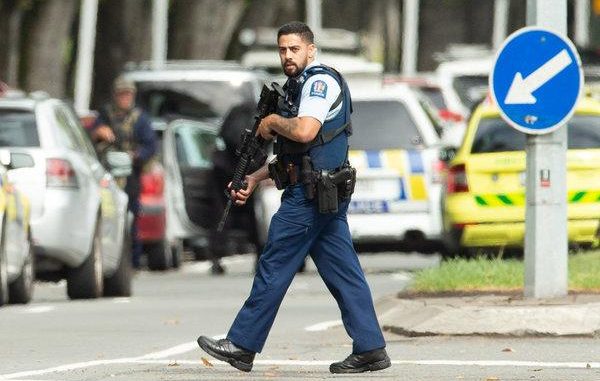
Long before a Minneapolis police officer pinned his knee to George Floyd’s neck, slowly cutting off his air supply until he was dead, American cops were killing black people with impunity. The officer who killed Floyd, Derek Chauvin, was operating as a member of the Minneapolis Police Department despite the fact that he faced at least 17 misconduct complaints. The officers responsible for the deaths of Philando Castile, Freddie Gray, and Terence Crutcher were either acquitted or had the charges against them dropped, and the officers who killed Michael Brown, Alton Sterling and Tamir Rice were never charged at all.
The frequency and uniformity with which cops are let off the hook for hurting or killing people of color is why anti-police brutality protests have erupted in every major American city in response to Floyd’s death. It’s also why activists are calling not to reform or re-train the police, but to defund them.
Usually, to “defund” something means to strip it of its funding entirely. But while there are some who would advocate to abolish the American police force wholesale, recent mainstreamed proposals to “defund” the police are actually just calling for their budgets to be drastically pared down, and for city and state municipalities to reinvest some of the money that would normally be spent on policing in housing, employment, and healthcare.
Over the past 30 years, police budgets have ballooned in American cities, with Forbes reporting that the U.S. now spends over $100 billion collectively on policing (despite reports that crime has fallen across the board during the same time frame, irrespective of the increased budgets). In the years since the September 11, 2001 terror attacks in particular, the massive cash influx has gone towards creating an increasingly militarized police force: Officers tote military grade weapons and drive armored vehicles, thanks in large part to a military-to-police equipment pipeline that some U.S. lawmakers are now calling to abolish. And at the same time police budgets have been getting bigger, attitudes on policing have been getting harsher, with many officers being trained to respond defensively and to reflexively deploy aggressive tactics in order to stay safe on the job.
But the fact of American police being armed to the teeth is particularly striking given that research has found no evidence that shoring up police budgets keeps civilians safer — in fact, to the contrary, a 2017 report from the Center For Popular Democracy found that reallocating the money currently being spent on policing towards “a living wage, access to holistic health services and treatment, educational opportunity, and stable housing… [would be] far more successful in reducing crime than police or prisons.”
A growing political coalition across the U.S. is taking those recommendations seriously, and calls for cities to reallocate some of the money that would normally be spent on installing more officers in neighborhoods to instead be diverted to programs that support public health are growing louder. The movement already has key allies in high places: On Monday, Congresswoman Alexandria Ocasio-Cortez (NY-14) tweeted her criticism of New York City’s bloated police budget.
“If police budgets bought peace, the $6 billion NYPD budget would’ve bought the most sophisticated de-escalatory operation in the world,” she wrote. “Clearly, it didn’t.
New York State Senator Julia Salazar also recently tweeted in support of defunding the New York Police Department, which currently has an operating budget of $6 billion that remained virtually untouched after Mayor Bill de Blasio’s post-COVID-19 budget restructuring (notably, the city’s Department of Education and Department of Youth and Community Development faced far deeper cuts).
“I think that attempts to reform the NYPD have failed — attempts to provide de-escalation training, to train officers on emergency, mental health, first aid,” Salazar recently told The Appeal. “When we look at their resources, and how they’re deploying them violently and recklessly, it makes the case even stronger for reducing their budget, and then using those funds for social services [like] harm reduction, community-based public safety.”
That ideology is mirrored in similar movements that have cropped up across the country: In 2019, activists in the Durham, North Carolina-based coalition “Durham Beyond Policing” campaigned for — and won — a commitment from the city government not to fund the hiring of new police officers. In her announcement of the decision to back the group’s proposal, Durham Mayor Pro Tempore Jillian Johnson wrote, “The safest communities don’t have the most cops; they have the most resources.” And in Austin, Texas, groups like the Austin Justice Coalition (AJC) have petitioned the city council to reallocate $1.75 million from the police budget to dedicate to EMS, so that 911 calls involving mental health emergencies would be handled by trained mental health teams instead of the police.
While a growing number of activists are eager to see police budgets shrink, a recent Gallup poll found that, despite high-profile instances of violence and misconduct, the police force is still an American institution that polls high in terms of public confidence. And powerful police unions and bargaining agreements help to grant officers ironclad protections around employment and benefits in many instances, which will mean that the fight to dismantle existing police infrastructure will be fraught.
But as Patrisse Cullors, co-founder of the Black Lives Matter movement, recently told “Nightline,” protesters across the country have isolated “police accountability” as their near-singular demand — and they aren’t likely to rest until they see it met.
“[Protesters] want to see the arrest of all the officers involved [in the murder of George Floyd]. They want to have no more terror, no more police terror in their communities,” Cullors said. “Everybody wants to be apologized to. Everybody wants to be told, ‘I’m sorry. What I did was wrong. It was unacceptable. We won’t do it again and, in fact, this is how we change.’”
Click HERE to read more.
You can publish this article on your website as long as you provide a link back to this page.

Be the first to comment